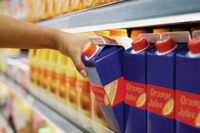Datamark Systems, a commercial printer and manufacturer of pressure sensitive labels and business forms, took up the challenge and met with a number of suppliers to help engineer a product that would meet the stringent requirements of Air Canada. The company partnered with Multi-Tac, Inc., Brampton, Ontario, Canada, a manufacturer/converter of pressure sensitive adhesive-coated rolls.
A Three-Way Partnership
According to Frank Filippelli, founder and president of Multi-Tac, Inc., “We look at the development of this particular product for Air Canada as really a three-way partnership between us, Datamark Systems and our adhesives supplier, Nacan Products (Brampton, Ontario).” Multi-Tac has relied on Nacan Products, Ltd., a subsidiary of National Starch and Chemical Co., Bridgewater, N.J., as its basic adhesives supplier since the early days of its operations.In the partnership to produce the baggage tags for Air Canada, Nacan Products supplies the NACOR® water-based pressure sensitive adhesive, Multi-Tac custom coats the stock to end-use requirements, and Datamark Systems die cuts and prints the finished product.
The New Tag
The new tag design replaces one that employed a 100-percent spun-bonded thermoplastic substrate that Filippelli describes as over-engineered and thus unnecessarily costly.The new tags are made of a proprietary, three-ply paper/plastic construction employing a NACOR pressure sensitive adhesive, printed by flexography and die-cut inline to meet the durability, readability and affordability requirements of the Canadian airline. The redesigned tags not only can be produced quickly on conventional equipment and lend themselves to the printing of legible graphics with bar codes that scan easily, but they also cost less to manufacture.
Production Operations
Multi-Tac operates a coater specially modified to run waterborne adhesives. A typical operation begins with the release paper, most of which Multi-Tac now makes itself to control costs. The paper is introduced into the coater, which applies the pressure sensitive adhesive. The coated substrate is then moved to a two-zone, gas-fired oven for curing; transferred to the specified label stick; and then sent to a slitter capable of cutting in widths of one to 81 inches. Multi-ply constructions, such as the Air Canada baggage tag, require an extra laminating step during the coating operation.The NACOR adhesive, which Nacan supplies in 2,600-lb totes, is pumped and filtered into the adhesive pan of the coater and applied by roller onto the silicone release paper. A wire rod scrapes off excess adhesive, which is recycled. Multi-Tac finds that the stackable totes not only eliminate the accumulation of drums and take a minimum of storage space, but also eliminate disposal headaches since they are returned to the supplier.
Waterborne Adhesives Only
One of the basic elements of its production of label roll stock was the decision by Multi-Tac at its inception in 1986 to use only waterborne adhesives. Although environmental issues at the time were not as sensitive as they are today, Filippelli believed it was the smart thing to do for the long haul.“In the beginning, we had to limit ourselves to those markets already using waterborne products,” explains Filippelli, “but we learned the right techniques and modified our equipment. Our business has grown substantially in that niche. Waterborne systems are no longer a limiting factor as more and more companies are switching to environmentally safer products.”
Multi-Tac most often uses one NACOR general-purpose pressure sensitive adhesive of different coating weights, depending upon the job, but can draw on Nacan’s ability to supply a range of acrylic and SBR emulsion products to meet unusual user needs when they arise.
Among the demanding applications that Multi-Tac has satisfied with custom substrates using specially suited pressure sensitive adhesives are vinyl labels for gas cylinders stored outdoors in severe weather and markings for the wet, soapy surfaces of cola coolers and soda machines.
Many of the wet-stick adhesives that Multi-Tac evaluated would not adhere to such surfaces, but Nacan tailored one of its products for these applications. Its waterborne wet-stick adhesive also increases in permanence and yields stronger bonds as time passes.
Project Completed
The project to redesign the baggage tag took six to eight months to complete. Datamark Systems’ Terry O’Neill said, “Finally, it was with the cooperation of Multi-Tac and its adhesive supplier, Nacan, that we were able to provide the strength, durability, proper adhesion and high-read rate for the baggage tags within the budgetary constraints of Air Canada.”According to Bob Blake, manager of customer service for ramp and baggage operations at Air Canada, the new baggage tags help with productivity, are more accurate and have helped to reduce the number of lost bags. “We are very pleased with this product’s performance.”
For more information on NACOR pressure sensitive adhesives from Nacan, a subsidiary of National Starch and Chemical Co., call 800-797-4992, e-mail nscinquiry@salessupport.com.
For more information on Multi-Tac, Inc., contact the company at 105 Nuggett Ct., Brampton, Ontario, Canada L6T 5A9; phone 905-791-0502; fax 905-791-0524.
For more information on Datamark Systems, contact the company at 910 Upton, LaSalle, Quebec, Canada H8R 2T9; phone 514-367-4468; fax 514-367-5298.
